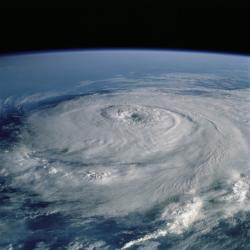UMD to Present Climate Finance and Risk Management Bootcamp
As climate change increasingly affects business decision-making, risk managers, financial analysts and other leaders must anticipate how weather events may impact their growth outlook, estimate how port taxes may increase because of rising sea levels, develop contingencies for supply chain disruptions and respond to the unexpected.
To give business leaders expertise in climate change and risk management, the University of Maryland will present a Climate Finance and Risk Management Bootcamp, on consecutive Thursdays, June 23 and June 30, 2022. The 10 a.m.-3 p.m. sessions, via Zoom, will be delivered by faculty experts in the University of Maryland’s Robert H. Smith School of Business and College of Computer, Mathematical, and Natural Sciences (CMNS).
The bootcamp is open to the public and geared to mid-career and senior professionals across industries, who increasingly weigh climate-change factors into business decisions and financial disclosures. The program is part of the Climate Finance and Risk Management at UMD initiative supported by experts in Maryland Smith’s Finance Department and CMNS’s Department of Oceanic and Atmospheric Science and Earth System Science Interdisciplinary Center (ESSIC).
“The recent SEC proposed rules for disclosing climate impact, coupled with the most recent and devastating IPCC report, is the strongest call to action yet for businesses to protect themselves,” says one of the instructors, Maryland Smith Professor of the Practice Clifford Rossi.
Rossi’s co-instructors and co-developers of the bootcamp are CMNS atmospheric and oceanic science associate professor Timothy Canty and Robert Brammer, an adjunct research professor for both CMNS and Maryland Smith.
The program is designed to equip participants to:
- Understand trends in global and regional climate change
- Identify how climate and weather impacts company earnings, asset valuations and various enterprise-wide risks
- Define the types of climate data and models available and evaluate their appropriateness for different climate variables and risk types
- Incorporate climate data and models into financial and risk analyses (including stress testing) and evaluate the implications and reasonableness of the resulting analysis
- Apply climate risk analysis into high-level decision making, strategic plans and effectively communicate key message
“The scientific community has all this information but there is this gap in how to take the information and put it in a format that business leaders understand,” says Canty. “Businesses want to know what is happening 10 or 20 years from now, however, their risks are much more immediate than those of the scientific community. We recognized that there was a need for better communication between the two.”
As world leaders, including in Washington, D.C., weigh new climate risk disclosure requirements for corporations, Rossi emphasized the need for decision-makers in business to understand the climate tools available to evaluate the pertinent risks.
“These industry practitioners aren’t necessarily going to go out and create their own climate model,” Rossi says. “They are going to leverage publicly available models. We want to educate these industry practitioners on the fundamentals of what it takes to conduct climate risk disclosures that the SEC will impose on many companies and related climate financial and risk analytics.”
Brammer says banks are concerned about the implications of climate change for credit risk on the part of companies they lend to, and asset managers are concerned about the implications for different asset classes like bonds, stocks and commodities. “When I’ve talked to some of the asset management firms about these plans for the UMD program, they’re very enthusiastic. They wanted this type of program yesterday,” he says.
For more information and to register for the June 23 and June 30 Climate Finance and Risk Management Bootcamp, go to the program homepage. For a preview, watch the recent Climate Finance and Risk Management Webinar featuring Rossi, Canty and Brammer.







